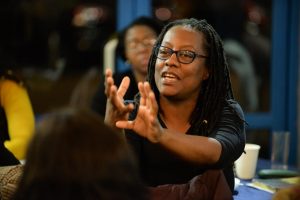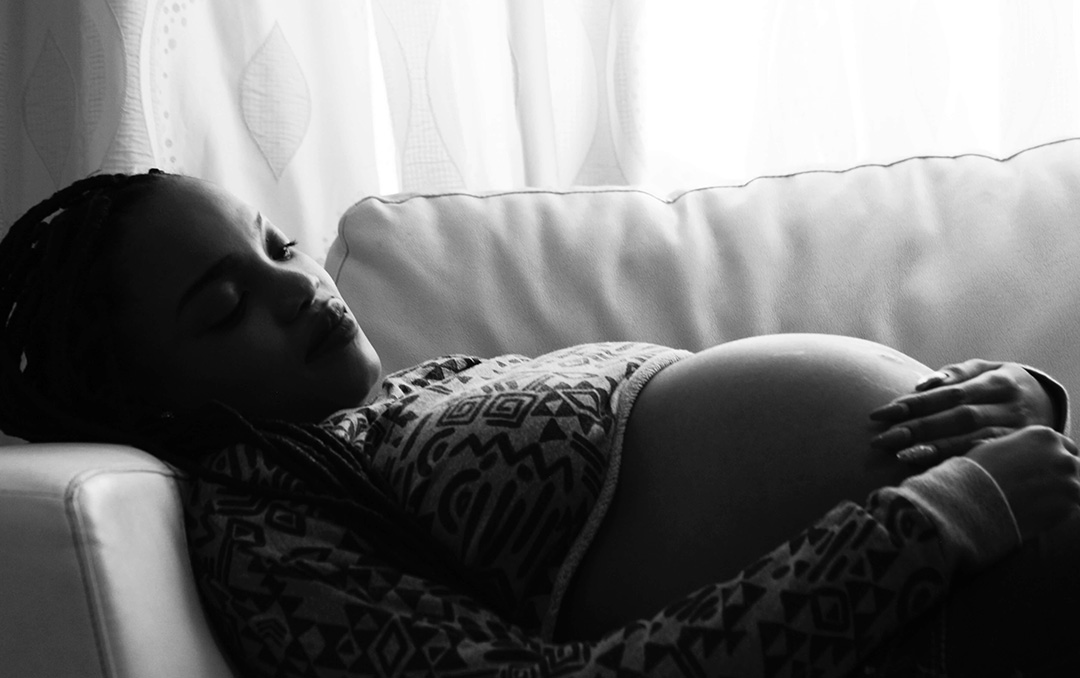One of the legacies of colonisation, and the continued colonisation of different groups of people, is the deliberate throwing away of cultural heritage and knowledge.
When I was younger, actually even now, my mum would talk about fish. ‘I dream a fish’, she’d say. We all instantly knew that the next words would be, “you pregnant?” We spent a lot of time laughing at mum and her ‘old wives tales’ until I discovered that fish are a symbol of fertility across the world. This made me think about other ‘old wives tales’ etc and things that people say.
‘Recognise and understand the traditions that birthing people bring with them.’
As a birth keeper, I become more and more aware of the different cultures that surround me. It inspired me to look into the birth traditions and cultures of different people. One of the things that I most enjoy in my Abuela Doula Preparation course (1), is reading the stories and the projects of my students. I remember being at a birth conference and meeting the incredible Indigenous Midwife, Ramiro Ramero. Ramiro comes from an unbroken line of traditional medicine going back generations. He spoke after Michel Odent and his opening words were, “Isn’t it great to see that science has caught up?” It’s important that we begin to recognise and understand the traditions that birthing people bring with them. It’s a never ending source of learning and it can only enhance our practise.
The MBRRACE report (2) shows that Black women are five times more likely to die in the perinatal period than white women. We also see that Chinese women do better than white women. Something that I recently learned is that Chinese women will often drink Sheng Hua Tang tea (3) for a period after their babies are born. In the West we often ‘pooh pooh’ cultural traditions that we do not see in our daily lives. What we have become good at doing, however, is appropriating cultural traditions, repackaging them and selling them back to the communities we have taken them from. A simple look at bone and body wrapping is the perfect example of this. This wrapping, or closing, happens across the world in African, Asian and South American traditions, and it wouldn’t surprise me if we didn’t find out that it reaches further.
When we look at the MBRRACE study, we have to ask ourselves some questions. What is happening? why are Black women five times more likely and Asian women are twice as likely as white women to die in the perinatal period? The maternal mortality rate is dropping, yet for Black women, it is increasing. It was just a couple of years ago that the statistics showed that Black women were twice as likely to die. So what has happened, or perhaps the question is what has not happened, why this should be so? I cannot answer that question as I am not a researcher, but I do know that the increase is real. And I do know that the research is there and needs to be looked at closely and actions taken to close the disparities.
When I talk about this, three things come up continually:
* Black people have a tendency towards hypertension, obesity and diabetes
* Black people don’t attend antenatal classes
* Black people don’t have the money to access support
Looking at this holistically, we have to ask the question, why is it that these are the things health care professionals believe and yet Black women are still dying at unacceptable rates? Is it difficult to provide resources for health care professionals and families alike to tackle these predispositions in Black people? Let us not imagine that white women do not also suffer from hypertension, obesity and diabetes. When we discovered that excess alcohol and smoking caused low birth weight babies, we made sure that resources were available, people were educated and we saw the positive results. We discovered the benefits of babies sleeping on their backs after birth, as we watched the SIDS rates fall by 75% in the first year after educating people about this. So we know that health promotion can make a difference.
‘When we blame black bodies, are we pointing ourselves towards eugenics?’
When we blame black bodies, are we pointing ourselves towards eugenics? Do we believe that black bodies are inferior to white ones? Black bodies across the world have better rates of maternal survival than those in the West, when socio-economics are taken out of the equation. This is something that we need to research and look into. What is different on the African continent for Black people, than being in the West? Studies show that there is racial bias in pain assessment and treatment recommendations, as well as false beliefs about biological differences between black and white people. (4)
For the longest time birth imagery has been white. As people began to become aware of the need to ‘diversify’ and become more inclusive, the images of black women and babies began to appear. For the most part though, they were attached to negative images thereby reinforcing the stereotypes already assumed about Black and BAME people. I remember looking at a major breastfeeding organisation’s pictures on their website. They showed a beautiful black woman, her baby and her mother. It looked like a fabulous, supportive family relationship and yet the article/information was about having unsupportive family. I got in touch with them to query the placement of their black imagery and got no response.
‘Weathering is the result of years of microaggressions that black people face.’
I accept that for many of you, that might seem like a tiny thing in the midst of the work that we are doing. So I’d like to direct you to ‘weathering’ – a term coined by Arline Geronimus (5). Weathering is the result of years of microaggressions that black people face all the time. Imagine a cliff being continually assailed by waves. The stones, clumps of earth, sand and vegetation are washed away. That is a very simple example of weathering.
If these are the images that we are using, why would Black people seek to get their birthing education from white people? It’s a simple thing to use inclusive teaching materials, but we need to demand equity in the pricing of these materials. A doula friend decided to source a black teaching doll. The price difference wasn’t small.
We accept that Black women are the lowest on the socio-economic scale. This may prevent them from attending antenatal classes that are in the day, as they might need to work and be unable to afford to take time off. It may be that their shift patterns, if they are working jobs with shifts, are irregular. It is up to us to find innovative ways to take the education to them without causing them financial hardship. I’ve seen people comment that Black women simply need avail themselves of yoga classes to have better outcomes. If money were the issue, and the reason that black women have worse birth outcomes, surely people like Serena Williams wouldn’t have nearly died after the birth of her daughter (6). White women with no college/university education, and low income, do better than Black women with university educations and high income.
This brings us to racial bias. What are we going to do about the fact that a patriarchal system isn’t great for women, and therefore a white, patriarchal system is not going to help Black women. There is much work that needs to be done to undo systemic and structural racism. We cannot blithely declare that our medical system is immune to this, when it is accepted that our justice and education systems continue to fail Black people and hold inherent racism. When Black women question, and/or decline treatment, they are accused of being aggressive, disruptive, bullying and uncooperative. They are often threatened with withdrawal of treatment or with social services. Black children are far more likely to be taken into care than white children. Health outcomes, educational outcomes and employment outcomes are disproportionately worse (7).
This is not going to have an easy fix, but each of us can make a start by holding up that mirror to ourselves and our own practise. It is time to confront personal implicit bias. It is not enough to say that we are non-racist, which is a passive way of living and ignoring the racism around us. We need to be anti-racist. Active in changing things around us.
It is unacceptable that Black women are dying at such rates. It is time that, in the words of Angela Davies, we change the unacceptable.
Footnotes and References
1. https://www.huffingtonpost.co.uk/entry/why-we-need-more-black-doulas_l_5c6aff56e4b0b9cc78ff2b3f
(2) Knight M, Bunch K, Tuffnell D, Jayakody H, Shakespeare J, Kotnis R, Kenyon S, Kurinczuk JJ (Eds.) on behalf of MBRRACE-UK. Saving Lives, Improving Mothers’ Care – Lessons learned to inform maternity care from the UK and Ireland Confidential Enquiries into Maternal Deaths and Morbidity 2014-16. Oxford: National Perinatal Epidemiology Unit, University of Oxford 2018/
3. https://www.ncbi.nlm.nih.gov/pubmed/19580970
4.https://www.ncbi.nlm.nih.gov/pmc/articles/PMC4843483/
5. https://www.ncbi.nlm.nih.gov/pubmed/30234347?fbclid=IwAR0Y4BK_mlV3MTbWyQyQgbn-az9T4KeJcoZxtqEi8APxg91TSyrnjKOprLw
6. https://fortune.com/2018/01/12/serena-williams-birth-story-black-women/
7. https://www.equalityhumanrights.com/en/race-report-statisticsreports?fbclid=IwAR3yGVN9I9tSHJ3s1jw9h207PDzQOGjfVybefXPyoOw7m8kkX7Y3ICaABn4
About Mars
 Double award-winning doula and birth activist Mars Lord has been a birth keeper for well over a decade. After attending the Paramana Doula course with Michel Odent and Lilliana Lammers, a spark was lit within her and the passion that she discovered for birth and supporting parents has fired her soul ever since. She has had the privilege of working with hundreds of families. A birth activist, with a desire to see the ‘colouring in of the landscape of birth’ and finding out the reasons for the maternal and neonatal morbidity rates amongst the BAME community, Mars created Abuela Doulas, a doula preparation course primarily, but not exclusively, for women of colour. Her desire for reproductive justice led to the creation of the ‘Reproductive Justice Retreat’. Mars was recently recognised in the Mayor of London’s Hidden Credits campaign and continues to speak out about cultural safety and reproductive justice.
Double award-winning doula and birth activist Mars Lord has been a birth keeper for well over a decade. After attending the Paramana Doula course with Michel Odent and Lilliana Lammers, a spark was lit within her and the passion that she discovered for birth and supporting parents has fired her soul ever since. She has had the privilege of working with hundreds of families. A birth activist, with a desire to see the ‘colouring in of the landscape of birth’ and finding out the reasons for the maternal and neonatal morbidity rates amongst the BAME community, Mars created Abuela Doulas, a doula preparation course primarily, but not exclusively, for women of colour. Her desire for reproductive justice led to the creation of the ‘Reproductive Justice Retreat’. Mars was recently recognised in the Mayor of London’s Hidden Credits campaign and continues to speak out about cultural safety and reproductive justice.
www.abueladoulas.com
www.marslord.co.uk
Facebook – https://www.facebook.com/abueladoula/
Twitter: @Abueladoula Instagram: @Abueladoula


0 Comments